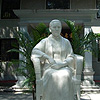On October 10, 1911, the Wuchang Uprising broke out. With one province after another declaring independence from the Qing Dynasty government. As a result, the rule of the Qing Dynasty collapsed, marking an end to the feudal autocratic monarchy of more than 2,000 years and founding the first republic in Chinese history.
To pay tribute to the 100th anniversary of the Chinese Revolution of 1911, with the guidance of Chinese Ministry of Culture, our team designed the photo album which is named "A Century of Change". Through the feature, we will share our insight from our hard work with the readers too.
The Great Achievements of the Revolution of 1911
As the history of the early 20th century Ye Zhongguo a major historical event, the 1911 Revolution the great merit is that it overthrew the feudal monarchy, the establishment of a bourgeois democratic republic, set up Asia's first Republic of China's capitalist political and economic modernization conditions.
1912 New Year's Day, Sun Yat-sen in Nanjing, the Provisional President of the Republic of China became the same year on March 11, announced <<provisional china="" of="" republic="" the="" constitution="">>, the official constitution as the fundamental law of the country before the enactment of <<the constitution="" provisional="">> requirements, ROC's sovereignty belongs to all citizens, the Republic of China are equal, people enjoy the personal, residential, property, speech, press, assembly, association, freedom of religion would lead the Chinese feudal autocratic democratic republic on the track, which is Xinhai The most important outcome of the revolution.
China has gradually introduced to the path of development of modern capitalism, led by Sun Yat-sen in Nanjing Provisional Government in its existence, just three months, issued a series of blow away the cobwebs of the Act, political, economic, educational and social aspects Change. Sun is indeed the founder of the Republic of China, the founder of the democratic republican form of government, to promote strong economic modernization and social customs of the active agents of change.
Lin Boqu participated in the 1911 Revolution, when in 1941, said with emotion, 'the emperor has not been for the rule of many young people, the political significance of the 1911 Revolution is often underestimated, this is not to blame, because they can not overturn thousands of years of experience inherited down the autocracy is not an easy task however(http://www.f-paper.com/). 'Emperor is sacred and inviolable in the past, the supreme, now the emperor can be down, then what is the corruption of the old things can not lose it? <<provisional constitution="">> For the first an explicitly declared: 'Republic of China's sovereignty belongs to the nation of all.' ever ordinary people from the 'people', 'subjects', 'ants', suddenly become masters of the country, which is what a great change! It is in the minds of social life and people caused great shock can be imagined. Thinking of the gate, once opened, this flood of shares on the Pentium emancipation forward, can not block the Revolution of 1911 to rule China for thousands of years absolute monarchy system in one fell swoop down, and this after the Chinese revolution opened the channel. This monumental performance is worth the big letters.
On the general trend of historical development, the history of Chinese Revolution is indeed an important watershed, which on the one hand the end of China's traditional society, the other opened a new era in Chinese history. As time goes by, it's the significance of the latter aspect becomes less prominent. although no final Revolution and achieve their political goals, not fundamentally change the face of China, but the Revolution, after all, a great democratic revolution, which includes the ideas of democracy large-scale spread of democratic revolution and the frantic action implementation. large-scale spread of democratic ideas for implementation of the democratic revolution has played a vital role in mobilizing public opinion, and the realization of the democratic revolution, the country's people received a extremely rare democratic education and the actual baptism(News News http://www.f-paper.com/).
For this reason, to overthrow the feudal autocracy and to overthrow the ruling emperor, such large-scale social revolution, the Chinese people is a profound and intuitive democratic education Revolution of 1911 as China's modernization process has opened up a path, cut off any of the Chinese society back possible.
(The author is vice chairman of NPC Standing Committee, the Central Committee of Revolutionary Committee of Chinese Kuomintang Chairman)
Source from xinhuanet.com
Editor: Shi Liwei
1、The Preparation of the Revolution
In November 1894, Sun Yat-sen setted up the Xingzhonghui in Honolulu. The next year in February, Sun built the headquarters of Xingzhonghui in Hongkong, and put forward the first guiding principle of the China democratic revolution.
2、The Uprising of the Revolution
The incompetent and corrupt rule of the Qing Dynasty caused extreme anger in Chinese people, finally, In June 1911, the Railway Protection Movement in Sichuan became the trigger of the Chinese Revolution of 1911.
3、The Success and Failure
December 1st, the Qing government signed the armistice with the revolutionary army, and the battle was stopped for three days. This truce is a key turning point that marks the revolution army changed the view from armed struggle to the politics of compromise.
4、Historic
The Chinese Revolution of 1911 is a great bourgeois-democratic revolution, which has far-reaching historic in modern Chinese history.




